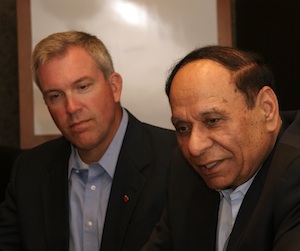Dr. Islam Siddiqui, chief agricultural negotiator with the U.S. Trade Representative’s office, visited a fruit growing and packing operation in Selah, Washington, on October 11 as the U.S. Congress deliberated over three new free trade agreements, which were passed the following day.
After flying to Seattle, Washington, he traveled to the Yakima area to meet with representatives of the tree fruit and other specialty crop industries and to tour the packing facility of Rainier Fruit Company. Siddiqui said he was impressed by the automation in the plant.
The free trade agreements—with Colombia, Panama, and Korea—were negotiated four years ago during the George W. Bush administration and revised by President Obama. Labor unions have opposed the deals and Obama postponed action on them until Congress agreed to reauthorize the Trade Adjustment Assistance program, which provides retraining for workers who are laid off for reasons related to trade. The agreements with Colombia and Korea are good news for Washington’s fruit growers.
Todd Fryhover, president of the Washington Apple Commission, said a free trade agreement with Colombia would greatly benefit the apple industry. Last season, Washington saw a 50 percent decline in exports to Colombia from the previous year when almost 440,000 boxes were shipped. Canada has a free trade agreement with that country and neighboring Chile has a zero tariff rate, putting Washington producers at a disadvantage.
“With this Free Trade Agreement we expect to see a doubling of the exports to Colombia,” he said.
It would be particularly advantageous to export there this season, he added, because Washington should have the smaller-sized apples that Colombia consumers prefer.
Exports to Central America have been increasing, he said, and better access to Panama would be a benefit, though it would have less potential impact than Colombia. Access to Korea for apples is limited because of phytosanitary issues, so the free trade agreement will have little impact.
However, B.J. Thurlby, president of the Washington State Fruit Commission and Northwest Cherry Growers, said the Korean agreement is the one of most interest to the sweet cherry industry. The agreement could boost Northwest cherry exports to that country by 100,000 boxes. Shipments have been averaging around 250,000 boxes for the past few years.


Leave A Comment